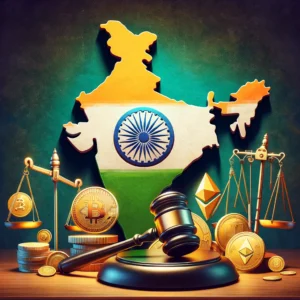Update Chrome Browser

Rahul, a skilled hacker, stole a significant sum through a digital heist. To convert his stolen funds into legitimate assets, he set up a fake bakery as a front for his money laundering scheme. However, stricter reporting requirements and increased scrutiny of large cash transactions made this method less viable. Desperate, he researched cryptocurrencies, drawn to their promise of semi-anonymous transactions. Rahul began moving his stolen funds into cryptocurrency. Yet, he soon learned that governments globally are enacting regulations to combat illegal activities within the cryptocurrency space. This growing crackdown on crypto-based money laundering underscores India’s determination to regulate this sector. Let’s explore the new Cryptocurrency and Regulation of Official Digital Currency Bill, 2021, and how it seeks to prevent criminals from exploiting digital currencies..

Digital Cash: Think of cryptocurrency like money that only exists on the internet. You can use it to buy things online or trade it, much like real-world currencies.Unlike banks where every transaction is recorded, cryptocurrency can sometimes move around more anonymously. This makes it appealing to criminals who don’t want to get caught with their illegal money.
Crypto is now under the money-laundering rules. The government is keeping a closer eye on cryptocurrency to prevent it from being used for illegal activities.
What This Means – The Specific Actions:
1 Swapping crypto for regular money (and vice-versa): Whenever someone buys crypto with Indian rupees (or sells crypto for rupees), the exchange has to follow certain rules.
2 Trading one type of crypto for another: Even if you swap Bitcoin for Ethereum, those transactions get tracked.
3 Storing and managing crypto: Companies that hold or manage cryptocurrency for others (like wallets or exchanges) have extra rules to follow.
4 Helping companies sell new crypto: When a new cryptocurrency is launched, anything related to that sale has to follow these rules too.
The Bottom Line:
The Indian government wants to make it much harder to use cryptocurrency for hiding illegal money.
All the above will be now covered by PMLA Act 2002
Cleaning Dirty Money: Imagine someone steals a bag of cash. They can’t easily spend it at a fancy store because the police might get suspicious. Money laundering is like taking that dirty money and making it look like it came from a legal source.
Common Techniques: Criminals might do this by:
Smurfing: Breaking large amounts into many smaller transactions. (Like a Smurf, breaking a big thing down into little pieces)
Setting up Fake Businesses: Like the bakery in our story, to pretend the illegal money is profits.
Gambling: Winning and then cashing out, making it seem like legitimate winnings.
Why is Money Laundering a Serious Crime?
It Helps Bad Guys: Money laundering lets criminals keep profiting from their crimes, funding even worse activities.
Unfair Economy: It gives crooks an unfair advantage over honest businesses.
Hurts Society: Money from crime often supports things like drug trafficking and terrorism, which harms everyone.
Cleaning Dirty Money: Imagine someone steals a bag of cash. They can’t easily spend it at a fancy store because the police might get suspicious. Money laundering is like taking that dirty money and making it look like it came from a legal source.
Smurfing: Breaking large amounts into many smaller transactions. (Like a Smurf, breaking a big thing down into little pieces)
Setting up Fake Businesses: Like the bakery in our story, to pretend the illegal money is profits.
Gambling: Winning and then cashing out, making it seem like legitimate winnings.
It Helps Bad Guys: Money laundering lets criminals keep profiting from their crimes, funding even worse activities.
Unfair Economy: It gives crooks an unfair advantage over honest businesses.
Hurts Society: Money from crime often supports things like drug trafficking and terrorism, which harms everyone.
Full Name: The Prevention of Money Laundering Act (PMLA), 2002.
India’s Cleanup Crew: Think of the PMLA as a rulebook designed to catch people who are cleaning dirty money.
Main Objectives:
Making Reporting Mandatory: Banks and other businesses have to report suspicious activity to help the government track suspicious money flows.
Punishment for Criminals: The PMLA has serious penalties for those who are caught laundering money.
Bringing Crypto into the Fold: The PMLA, along with new crypto regulations, aim to make crypto transactions more transparent. It will be harder to use crypto for sneaky money laundering operations.
Tracking Gets Tricky: The nature of cryptocurrency makes it harder to track exactly who owns what, compared to a traditional bank account.
International Borders: Crypto moves easily across the globe, making it difficult to enforce laws within just one country.
NOTE: All information on CURIOUS is for Educational Purpose only
©2023 CREATED BY CURIOUS